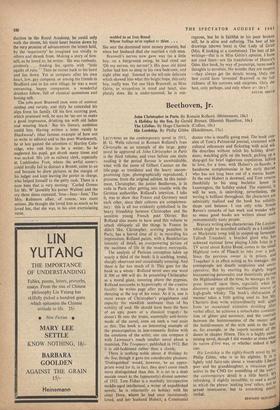Beethoven, Jr.
John Christopher in Paris. By Romain Rolland. (Heinemann, I8s.) His Lordship. By Philip Gibbs. (Hutchinson, 15s.)
LECTURING on the contemporary novel in 1911, H. G. Wells referred to Romain Rolland's lean Christophe as an example of the large. gutsy novel he approved of. John Christopher in Paris is the third volume, and even before one starts reading it the period flavour is unmistakable, what with the name of Gilbert Cannan on the title-page as translator and the heavy uncom- promising type, photographically reproduced, I presume, from the original edition. In this instal- ment, Christopher, the junior Beethoven, is in exile in Paris after getting into trouble with the German authorities. Rolland's intention, I take it, was to show that France and Germany need each other, since their cultures are complemen- tary: this is all too evidently symbolised in the heavy friendship between Christopher and the sensitive young French poet Olivier. But Rolland also seems to have used this volume to attack obliquely all the things in France he didn't like. Christopher, arriving penniless in Paris, has a horrid time of it; in recording his impressions, Rolland paints, with a Baudelairian intensity of detail, an overpowering picture of the nastiness of life in the modern metropolis.
The analysis of Parisian corruption takes up nearly a third of the book; it is scathing, brutal, sharply observant and occasionally amusing: And there is far too much of it. This goes for the book as a whole: Rolland never uses one word if 300 or 400 will do. In presenting Christopher as a moral giant, towering above the pygmies, Rolland succumbs to hypertrophy of the creative faculty; he writes page after page like a man shouting at the top of his voice. As it is, one is more aware of Christopher's priggishness and capacity for mawkish sentiment than of his nobility of soul. He should have been the hero of an epic poem or a classical tragedy; he doesn't fit into the ironic, essentially anti-heroic mode of the novel, even on such a vast scale as this. The book is an interesting example of the preoccupation in late-romantic fiction with the emotions of the artist; one can compare it with Lawrence's much smaller novel about a musician, The Trespasser, published in 1912. But it is old-fashioned rather than a classic.
There is nothing noble about A Holiday by the Sea, though it gave me considerable pleasure. 'Distinguished' would, however, be an appro- priate word for it; in fact, they don't come much more distinguished than this. It is set in a drab seaside resort in the (apparently) dismal summer of 1932. Tom Fisher is a morbidly introspective middle-aged intellectual, a writer of unpublished novels; he is reluctantly on holiday with his sister Dora, whom he had once incestuously loved, and her husband Hubert, a Communist doctor who is steadily going mad. The book con- sists of Tom's Palinuroid journal, crammed with cultural references and flickering with acid wit. He describes without relish his holiday diver- sions; watching girls on the beach, picking up a shop-girl for brief inglorious copulation; falling in love, for a time, with Hubert's etc-fiancee. a handsome nymphomaniac in her early thirties who has not long been out of a mental home. In the end Hubert is drowned, and Tom returns thankfully to his snug bachelor home in Leamington, the holiday ended. The material, It will be seen, is uninviting; nevertheless, the writing is brilliant throughout, the characters are admirably realised and the book has solidity' shape and balance. I can only echo Simon Raven's remarks of ,last week and wonder whY so many good books are written about such monumentally nasty people. Bravura writing also characterises The Lifeline, which might be described unfairly, as a Linklater or Mackenzie romp told in souped-up Jamesese. Tulloch Traquhair, a bearded giant who has achieved national fame playing Little John in a; TV serial about Robin Hood, comes to the small Highland town of Fluach to take over a pub. Since the previous owner is in prison, and Traquhair is in effect acting as his manager, the townspeople are dourly suspicious and unco- operative. But by exerting his slightly bogus buccaneering personality and theatrically playing the Highlandman all the time, he manages to ii press himself upon them, especially when he discovers an apparently inexhaustible source of high-grade whisky. The book's elaboration of manner takes a little getting used to, but Mr' Charteris does write extraordinarily well: apart from an occasional excessive straining after verbal effect, he achieves a remarkable combine' tion of glitter and accuracy, and the contrast between the boisterousness of the matter and the fastidiousness of the style adds to the fun; as, for example, in the superb account of the dance in chapter fifteen. This is a highly enter' tabling novel, though I did wonder at times whet, its raison d'être was, or whether indeed it had one. Ills Lordship is the eighty-fourth novel by Sir Philip Gibbs, who is in his eighties. It is lightly told fairy-tale about a venerable Liberal peer and his granddaughter, a vivacious piece active in the CND (or something of the sort' the contemporary detail is a little hazy). It refreshing, if slightly incredible, to read a novel in which the phrase 'making love' refers. not to sexual intercourse, but to something purely verbal.
BERNARD BERGONZI


































 Previous page
Previous page